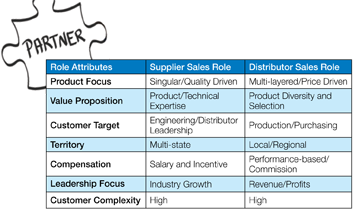The changing sales dynamic

by Ty Swain
Much has changed in the 20 years since Growth Dynamics began researching the unique complexity of the sales arena. Everything from technology, to how customers communicate, what they expect and how they run their businesses has had a major impact on how the sales force must perform to succeed in both supplier and distributor companies. In the past, the role of a distributor and supplier was fairly specific. Suppliers utilized distributors to sell and develop business for their products in a specific market area or industry. Distributors counted on the supplier or manufacturer to provide technical support, training and product availability. All fairly simple right? Well, not today.
What Has Changed for Suppliers and Distributors?
The functions of distributors and suppliers have evolved sharply as a result of the 2007- 2009 economic downturn. Those that survived this economically challenging time came out of the other end leaner and more strategically focused in order to differentiate themselves in the marketplace.
Suppliers started looking carefully at the fit and capability of their distributors, how best to optimize their distribution channel and how to align their sales force to meet customers’ changing needs and expectations.
And distributors started looking carefully at their supplier partners and asking, “How do our product lines support our target customers, can our sales team sell these products and does it add to our profitability? Or, are we just carrying a product line because we always have?” Hard questions leading to hard decisions.
Making sound, strategic decisions became a requirement to survive the “new” economy as both suppliers and distributors focused on the growth of their businesses, their ability to meet customer requirements and their profitability. This is when sales became more complex for both organizations.
The Industry Today – Suppliers, Distributors and the Customer
As we look back over the past seven years, never in the history of sales has technology, customers and the marketplace changed so drastically so fast. Today’s customers are increasingly focused on operational improvements to drive profitability, requiring more than service or a product to support their needs.
Advancements in technology and manufacturing processes have heightened customers’ needs for solutions that fit their specific requirements, making the role of the sales professional (both distributor and supplier) more difficult. As customers have become more sophisticated, knowledgeable and demanding, sales professionals must be better at discerning the buying process and the value proposition the customer seeks.
For success in developing new business and growing customer accounts, many top performing distributors and suppliers are joining forces so both can win in the marketplace. A distributor may agree to carry a supplier’s line as a Tier 1 offering, committing to specific revenue or sales growth. A supplier may agree to support the distributor as a primary regional partner and not provide product access to competitive distributors in their area. They partner together to develop plans that support customer expectations and requirements and meet their mutual business growth goals.
Company leadership of both organizations is directing this shift in partnership agreements to create a more accountable and effective relationship at the sales level, driving the sales teams to work together to achieve mutual success at the customer level. This type of partnership often establishes transparency in the sales process and increases the effectiveness of partnered selling. Successful sales teams can now count on each other to develop or target new business and work together to secure new accounts.
So whether you are a supplier or a distributor sales organization, understanding the nuances of the other’s environment and sales expectations will establish the pathway for a strong partnership. Following is a summary of the role of sales at a supplier and distributor.
 The Role of Sales at the Supplier
The Role of Sales at the Supplier
Sales professionals with supplier organizations must manage multi-state territories consisting of end-user customers and distributor channel partners. The role is two-fold, requiring the ability, knowledge and expertise to engage and develop business with end-user decision makers, such as engineers and production managers, as well as the ability to develop strong relationships with distributor sales teams as a solution-oriented resource. Not only must the supplier sales professional provide product training and technical support to the distributor, they must also be able to provide effective sales support through partnered customer visits and by bringing the sales team qualified leads for new business opportunities.
The Role of Sales at the Distributor
Sales professionals with distributor organizations will manage a local or regional territory to service, support and grow existing customer accounts and develop new business. The role requires knowledge of a diverse range of supplier products, solutions and applications. While some distributors focus on moving products, others seek to be a solution provider to meet customer needs and specifications. As product lines become more complex, the sale becomes more difficult. The distributor sales professional must be able to effectively engage and utilize supplier resources to support sales success and customer retention and growth.
Distributor Sales Professional vs Supplier Sales Professional
While many times the role of a sales professional is generalized as similar, the fact is, it is very different in a supplier organization versus a distributor organization. The table above summarizes major differences.
Sales professionals in both organizations must work to understand each other’s business and share ideas, product innovations, applications and selling approaches to effectively meet customer demands, specifications and requirements. Collaborating on how each can contribute and support the sales process deepens the supplier/distributor relationship and creates trust and a true partnership.
Leadership Solutions to Support Effective Partnerships
In today’s challenging, competitive marketplace, it is imperative for the leadership of suppliers and distributors to establish value-added, partnered relationships that support the sales team, create differentiation in the marketplace and mutually benefit company growth goals, performance and profitability, allowing both organizations to succeed.
Growth Dynamics’ research validates that company leadership in successful supplier and distributor organizations are gathering business intelligence that enables them to develop targeted strategies that advance the partnered efforts of their sales teams to develop and retain customers.
With suppliers placing greater importance on optimizing the distribution sales channel, successful leaders are utilizing tools to gain the voice of their end-user customers and their distributor channel partners to better understand their needs. Leadership is then able to arm the sales team with targeted knowledge and information on how to effectively meet customer expectations as well as how to best work with the distributor partner.
Likewise, successful distributors are utilizing tools to gain the voice of their customers and then arming the sales team with customer intelligence on what products, services and support they seek. The distributor sales professional can then partner with the supplier sales professional to provide a solution that will meet the customer’s requirements and expectations.
Future Success
The future can be summarized in one specific term: complexity. As technology continues to advance, manufacturing continues to increase in complexity and so does sales. The sale for both the distributor and supplier will be in the solution. As supplier and distributor organizations look to the future, the ones that work together to provide the best possible solution that supports the customer will win.
 Ty Swain is CEO of GrowthDynamics. GDI provides world-class sales solutions for the selection, performance and retention of the right sales force that fits your company, culture and customers. Visit www.gdicorp.com or email Ty at tswain@gdicorp.com.
Ty Swain is CEO of GrowthDynamics. GDI provides world-class sales solutions for the selection, performance and retention of the right sales force that fits your company, culture and customers. Visit www.gdicorp.com or email Ty at tswain@gdicorp.com.
This article originally appeared in the Sept./Oct. 2017 issue of Industrial Supply magazine. Copyright 2017, Direct Business Media.













